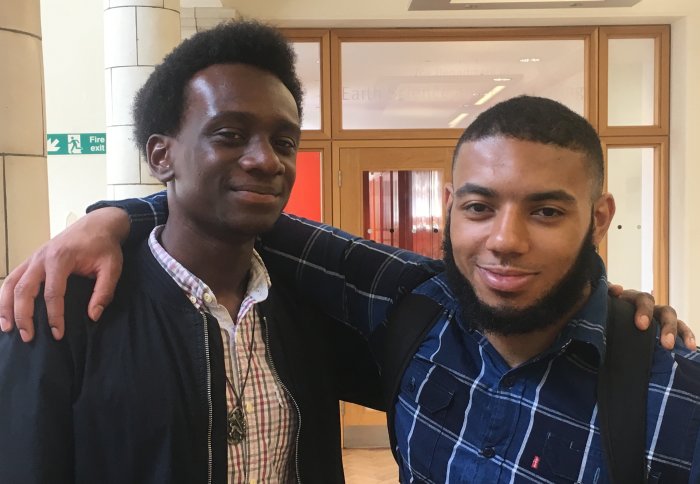Imperial welcomes Amos changemakers

Amos Bursary students, Faustino McCalla St Luce (left) and Renell Harding (right)
On 13 July Imperial hosted the Amos Bursary, a group set up to address the under representation of young black men in education and the workplace.
The Bursary offers young black men the skills to progress in their chosen career or field of study. It was established in 2009 in memory of Mike and Dolly Amos, parents of Baroness Amos of Brondesbury, former Cabinet Minister and Under-Secretary-General for Humanitarian Affairs and Emergency Relief at the United Nations. She is currently the Director of SOAS, London University.

Imperial supports the Bursary in a number of ways, including providing student mentors and event space. In the past year Imperial’s Dr Bianca Bailey-Wilson has also conducted PhD research on issues of diversity, inclusion, student well-being and under-representation, which featured Bursary students.
In her opening address Baroness Amos gave some sage advice to delegates: “No matter where you study or work, take the time to closely scrutinise that institution’s culture.
“There’s a compromise that must take place, those with privilege need to recognise what steps they have to take to improve diversity for others around them. Society can’t have its cake and eat it.”
Promising future
Conference delegate, Nnaemeka Anyamele, has applied for a place on the College’s Aeronautical Engineering course. The Bursary event was the first time he had been on-campus since attending an Open Day.

He took the time to reminisce on what led him to apply to join Imperial: “I’ve dreamed of studying aeronautics for as long as I can remember. As I live in Dulwich I’ve always had the Heathrow flightpath directly above me. Day-to-day I would look up and wonder what kept all those planes in the sky!
“Once I’ve graduated I would love to go and work with some of the biggest companies in the world – Airbus, BAE Systems and the ground-breaking HyperLoop project are particular favourites of mine.”
The road to success
Conference delegates Renell Harding and Faustino McCalla St Luce reflected on the Bursary’s support for them over the years, as well as their own hopes for the future.
"We work on building the confidence of these young guys and ensuring that they have the skills to succeed." Renell Harding
Renell, currently studying History at Swansea University, was recently appointed as a mentor to Year 12 pupils. He said: “Being involved in the Bursary these past years has been great. We work on building the confidence of these young guys and ensuring that they have the skills to succeed.
“It’s really important that they feel comfortable working in group settings and expressing opinions. Once you’ve arrived at university or entered the workplace this is something you have to quickly get used to.
Faustino, currently studying Politics, International Studies and French at University of Warwick, recently benefited from the Bursary’s USA work placement scheme. He challenged himself to apply for a finance role while posted in Washington D.C, although he hopes to secure a position in the Foreign and Commonwealth Office once graduated.
Faustino said: “The Bursary encourages you to focus on your personal development. Staying involved and engaged with the group has opened up a really useful network for me over the years.”
Imperial's ambition to transform teaching and learning
 In highlighting the importance of diversity and empowerment, the Bursary and Imperial will work together to tackle the bias that exists within higher education.
In highlighting the importance of diversity and empowerment, the Bursary and Imperial will work together to tackle the bias that exists within higher education.
The College's Vice-Provost for Education, Professor Simone Buitendijk, attended the conference and highlighted the parts of Imperial’s Learning and Teaching Strategy that will help reduce the challenges many black students encounter when they apply for a university place.
Professor Buitendijk, said: “We want students to not only do well in their studies, but also to feel included and part of a community during their entire university experience.
"Increasing diversity at the College will be a positive step forward, but we can’t stop there" Professor Simone Buitendijk Vice-Provost (Education)
“Research is conclusive, students with BME backgrounds face more challenges than their peers, and that influences their chances of academic success. Conscious and unconscious bias exists across society, and at Imperial we're no different. As individuals we’re responsible for our behaviours, but since a lot of bias is subconscious, this is also an issue closely connected with the way the university as a whole operates.
"We’ve looked at the evidence and will use it to change our systems and culture, and thereby our classrooms and campus.
“Increasing diversity at the College will be a positive step forward, but we can’t stop there. Creating the best and most inclusive environment for our students is only possible if we know in what areas we are doing well, and where we must try much harder.”
Article text (excluding photos or graphics) © Imperial College London.
Photos and graphics subject to third party copyright used with permission or © Imperial College London.
Reporter
Murray MacKay
Communications Division